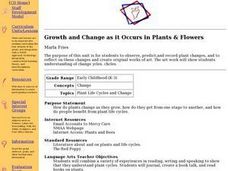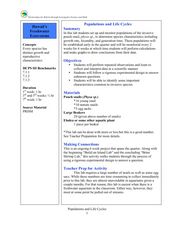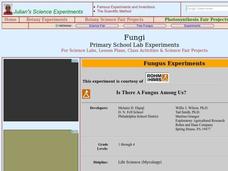Serendip
Changing Biological Communities – Disturbance and Succession
After cutting down a forest to make a farm, how long would it take the environment to turn an abandoned farm back into a forest? Scholars study this exact scenario while they interpret many charts and graphs of the changing ecosystems as...
Curated OER
It's Just Dirt
Learners discover how seed germination varies according to the soil type. In this soil science lesson, students discuss what plants need in order to grow and investigate various types of soil. Learners use their senses to describe each...
Curated OER
The Mister Runtles' Bet
Learners listen to a story dealing with exponential and linear growth. After reading the story, students complete a table comparing information. Using a calculator, learners graph the rice and daily population of flies. They study the...
Curated OER
Observing Pods
Students observe the pistil growing into a tiny string bean-like seed pod. They then observe the development of the fertilized pods between Day 17 and Day 35 and record their observations by drawing and labeling, writing, and graphing. ...
Curated OER
The Plant Restoration Project
High schoolers discuss Restoration Ecology. They see that restoration can mean removing invasive, non-native plants and replacing them with native plants grown by Students.
Curated OER
Measuring the Effects of Gravistimulation on Plants
Students conduct an experiment to determine if a plant's response to gravity is affected by different angles of plant orientation.
Curated OER
Ready for Roots
Fourth graders sort seeds and predict what conditions are needed for them to germinate. They keep the seeds moist, observe and measure their growth and graph the results. As the seeds start to grow students compare and contrast the each...
Curated OER
Growth and Change as it Occurs in Plants and Flowers
Students work together to observe plants and flowers through their life cycle. In groups, they make predictions and record changes in a journal. Using this information, they create their own original artwork and discuss the plants life...
Curated OER
Bottle Habitat
In groups of four, students construct aquatic habitats in pop bottles. They create charts and record data from observations over a four week period. Then they graph their data and write explanations for what they observed.
Curated OER
How Much is Dirt Worth?
Fourth graders graph the percentages of the materials that make up the Earth and complete computations based on their results. In this topsoil lesson plan, 4th graders diagram the different layers of Earth's composition.
Curated OER
Polluted Soil
Students take plants of their own choice and pollute the soil with a pollutant of their own choice or one assigned by the teacher. They regularly record observations such as plant growth, health, and soil pH.
Agriculture in the Classroom
The Garden Chef
Introduce young chefs to nutritious eating with a cookbook that is divided into sections focusing on one of the five food groups. It includes lessons, activities, and recipes. How wholesome!
Curated OER
Archaeobotany
Students study pictures of seeds and the conditions in which they grow during their study of archaeobotany. They infer ancient plant use by looking at archaeobotanical samples. They determine the change of plant use by interpreting a...
Curated OER
Let it Grow, Let it Grow, Let it Grow
Students investigate, through a hands-on activity, in which type of soil a bean seed grows best. They create a bar graph representing each plant's growth in different soils.
Curated OER
Which Way to Roots Grow?
Second graders explore roots and how they grow. They observe as seeds planted in various directions grow and record their observations. Students discuss the direction in which the roots are growing.
Curated OER
Bean Sprout
Student will track the growth of his/her bean sprout with sunlight and without sunlight over the course of 3 weeks. They will enter the results into an excel data base then graph the results of both variables to make the comparison.
Curated OER
Using a Database in Science Experiments
Fifth graders plant and take care of a lima bean plant and make predictions on its growth. In this science instructional activity, 5th graders chart their records and make conclusions about their experiment.
Curated OER
Understanding How Potatoes Grow
Second graders make a KWL chart and brainstorm what they need for the project of growing potatoes. They choose one potato and plant it in water or peat moss cups and choose a location in which meets the needs of the plants and make their...
Curated OER
Populations and Life Cycles
Students explore biology by researching ocean statistics. For this data analysis lesson, students conduct a snail examination experiment utilizing live pouch snails. Students collect data about the snails over the course of six weeks and...
Curated OER
It's All About the Roots
Learners investigate the process of hydroponic agriculture. They grow beans in different hydroponic solutions, compare results and graph their observations.
Curated OER
Soil Microbiology- Nitrogen cycle
Students take a virtual trip to a Catfish Aquaculture Pond and analyze soil bacteria to determine how many nitrogen cycle bacteria are present. They graph the number of colonies present and use data to determine ammonium levels in the soil.
Curated OER
Lesson 3: Life Cycle of Brassica Plants
Students investigate the life cycle of brassica plants. In this science lesson, students observe each stage in the life cycle of their plant. Students record their observations and graph the data. Students
Curated OER
Creating an Experimental Design
Middle schoolers research the damage to the environment by certain plant species. They create an experimental design which they test how these species take over certain habitats. They share their information with the class.
Curated OER
Fungi
Students examine the characteristics of fungi. In this biology lesson, students investigate the factors needed for fungi growth. They collect data and observations and write a report about them.

























